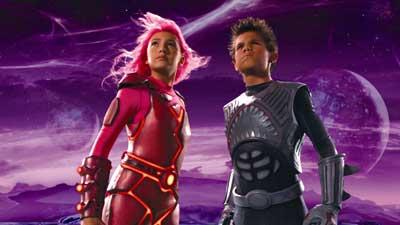
When I was a boy, I had a dream in which some grown-up called me a “kid”, and I, feeling a bit indignant, replied, “So I’m a goat, am I?” And then I sprouted horns, tilted my head down, and rammed the guy in the gut. (I think my dream may have been influenced by the 1936 cartoon Alpine Climbers, in which Donald Duck charges down a hill and head-butts a mountain-goat, but that’s a guess.)
I thought the dream was pretty clever, so I described it to my father, who, as I recall, wasn’t particulary impressed. I can’t say I’m all that impressed by it now, myself, either. But I was reminded of that dream and the pun therein while watching The Adventures of Shark Boy & Lava Girl in 3-D last Saturday.
The film is directed by Sin City‘s Robert Rodriguez from a story developed by his son Racer; whereas the elder Rodriguez merely alluded to the inspiration he got from his kids in interviews when he was promoting the Spy Kids movies (my review; my review), the new movie puts his son’s name right there on the screen, and even introduces itself as “A Rodriguez Family Production”.
And as with my dream, so here: there’s a fair bit of literalistic wordplay that is kind of lame from a grown-up perspective, but could very well keep children entertained. Indeed, on the bus ride home, I overheard three boys discussing the film, which they had not yet seen, and one of them was clearly looking forward to the scene in which one boy says the words “brain storm” and then a bunch of brains start falling from the sky. I had to get off the bus at that point, so I didn’t stick around long enough to discover if the boys also knew that these words are followed by “brain freeze”, which pauses the falling brains in mid-air, and then by the words “brain fart”, which … well, you’d better see that one for yourself.
Dreams, incidentally, are one of the key themes of this film. The main character is neither Shark Boy (Taylor Lautner, in his second film) nor Lava Girl (Taylor Dooley, in her first), but Max (Cayden Boyd, in his seventh), a boy who has dreamed these characters up and written about them in his “dream journal”. One day a bully named Linus (Jacob Davich) takes the journal from Max, handing a “revised edition” back to him the following day; this provokes a fight in the classroom that is interrupted by two things: one, a tornado; and two, when Shark Boy and Lava Girl themselves appear from out of nowhere, demanding that Max come back with them to save their world, Planet Drool, from dying.
Bits of the story reminded me of Tron (1982). Max, like Flynn, has helped to create a universe without realizing it, and some of its inhabitants happen to resemble people in the real world; and Max, like Flynn, is dragged into this world without knowing how or why he got there, but once there, he is expected to discover or develop powers that will aid in the redemption of that world. (One big difference is that Flynn was dragged into his world by its villain, whereas Max is dragged into his world by its heroes.)
Meanwhile, just as Sark was the “point villain” working for the MCP in Tron, the main villain in this film is Mister Electric (George Lopez), who similarly answers to an abstract, computer-generated face. BTW, Mister Electric gets in a few of his own lame puns, too, such as when he greets one of our heroes with the words “Watt’s up!?” or when he promises to do something to his enemies that really “hertz”. And I really liked the plug-hounds and the slithering extension cords that he sends in pursuit of our heroes; they make a nice counterpoint to the Lego blocks and Nintendo Gameboys that populate the “graveyard of forgotten dreams”.
The film also reminded me of The Neverending Story (1984), particularly the way the boy has to save the world from dying — in Tron, the world in question was merely enslaved — and the way that he achieves this with the help of an “ice princess” who bears a striking similarity to the “childlike empress” of that other film.
The film’s artistic or cinematic merits are a mixed bag. I think the story probably holds together, with less internal inconsistencies and “huh?” moments, better than the last couple of Spy Kids movies did. On the other hand, none of the actors has the charisma that the Spy Kids actors did: Lautner, who was into martial arts in a big way before he turned to acting, is especially prone to strutting and posing, and at one point he has to sing a lame hip-hop song in order to stimulate Max’s imagination; and Dooley’s tendency to Smile Really Big gives the impression that she is more of a model than an actress. It is certainly difficult to imagine a trilogy being built around these two the way that Spy Kids was built around Daryl Sabara and Alexa Vega.
What’s more, there is a distinct lack of star power here; in the place of Rodriguez stalwarts like Antonio Banderas, Salma Hayek, Elijah Wood and others, we have, uh, David Arquette and Kristin Davis as Max’s parents, both of whom are compelled to wear rather goofy-looking “cookie giant” outfits at one point.
But however flawed the movie might be, I do really like its central premise — that Max can only bring about the redemption of his world when he becomes a “daydreamer”, capable of dreaming with his eyes open. That resonates with me in a big way.












